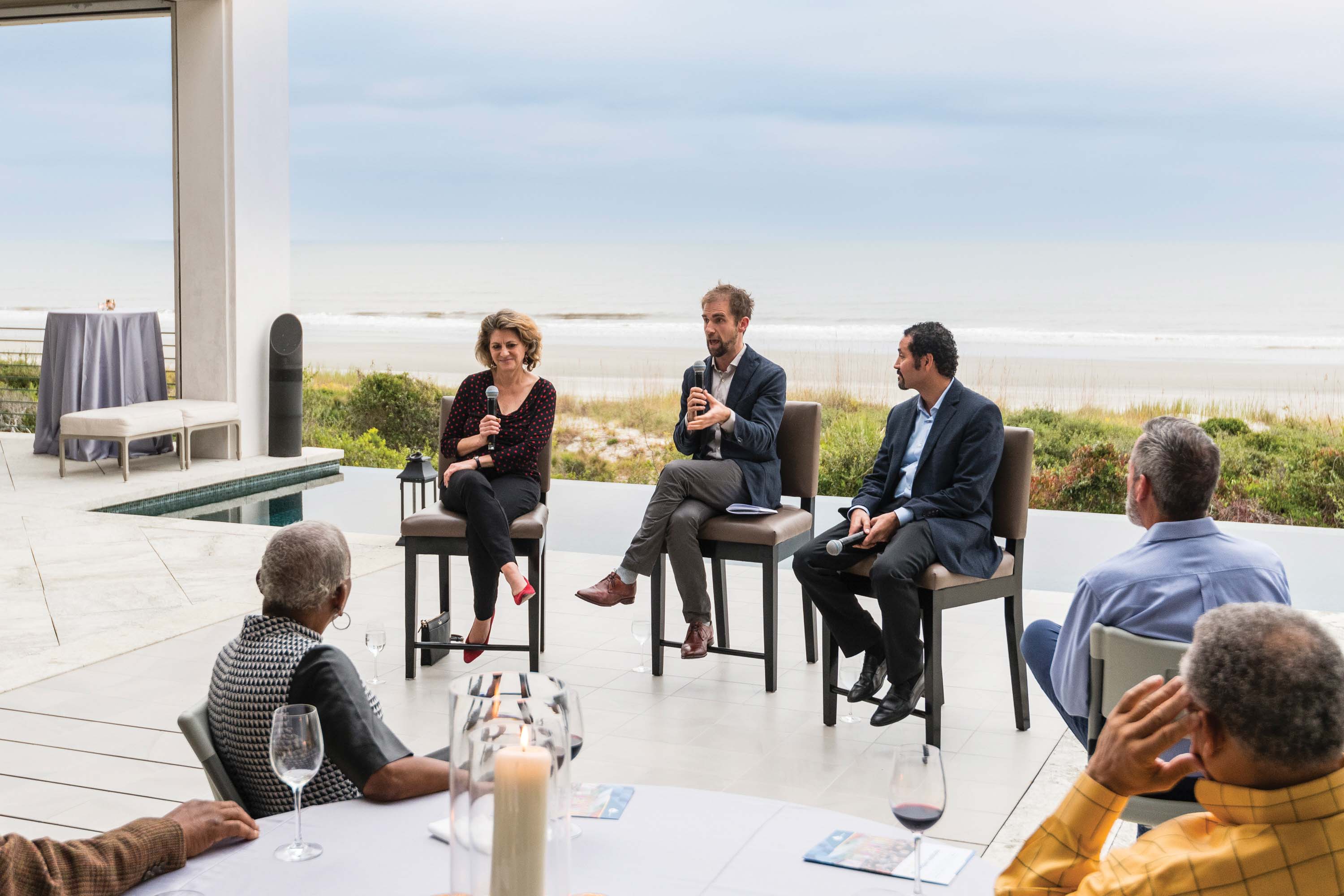In The Living Room with Tamar Gendler
Writer Allston McCrady speaks to Yale Professor and American philosopher Tamar Gendler about the ancient secrets of happiness.

AM: I would love to hear about last night’s talk hosted by Dr. Tony Coles and his wife Robyn.
TG: The Aspen Institute and Advance Kiawah invited me to the Island for a panel, which turned out to be uncannily well constituted. The three of us on the panel had never worked together before, but we all come from the same intellectual tradition. It felt like a conversation among people who share a set of fundamental commitments but who bring a range of different perspectives. The entire event was fabulous. The weather was gorgeous, and the Coles’ house has a perfectly framed view of the ocean, so the conversation was set in front of a postcard view. The landscape at Kiawah is the kind of visual that you’d never tire of.
AM: Who were the other panelists?
TG: One was a lawyer named Brandon Paradise, who teaches law at Rutgers University, and one was a political theorist named Sam Kimbriel who oversees philosophy activities for the Aspen Institute. The thing that united the group was a serious engagement with the possibility of thought to guide human life, and also a recognition of the ways in which human beings are complex. We all had textual tradition as a common touchpoint, which we’ve all been seriously engaged with as learners and as teachers. All of us have experience in classrooms, trying to bring out this tradition’s significance to somebody who hasn’t met it before.
AM: I found your lecture on YouTube that dealt with the secrets of five ancient Greek and Roman philosophers: Socrates, Plato, Aristotle, Cicero, and Epictetus. Was your Kiawah discussion along similar lines?
TG: The conversation was about the way in which ancient wisdom can help guide human happiness. I started with the fundamental Platonic insight that we’re pulled in different directions by the different facets of ourselves. Every religious tradition struggles with something like the distinction between head, heart, and appetite—with our tendency to be drawn one way by our commitments while being drawn in another way by our desire for pleasure. All temptations—food or sex or indulgence in the social world—all of those are genuine forms of pleasure; they just need to be moderated. During the second part of the conversation, we talked about three ways you can do that moderation: through the Aristotelian idea of habit; one of which is through the Cireronian idea of friendship, community, and the value of a social frame; and through the Epictetan idea of sorting that which is up to you from which is not. So I framed it as “one problem, three solutions.”
AM: I’ve been wanting to change a few habits, and I’ve had a hard time taking the first step. I keep thinking of the Nike slogan “Just do it,” which I now realize is classic Aristotle.
TG: Aristotle basically says, “Just as you become a harpist by playing the harp, just as you become a piano player by playing the piano, so too do you become brave by acting brave, or acquire virtue by acting virtuous.” One of the interesting things about Aristotle is that the things he calls virtues are forms of moderation. So think about bravery: Aristotle says bravery has two opposites. One of its opposites is cowardice, but its other opposite is recklessness. Aristotle believed virtues are cultivated through habit, and these habits are habits of moderation. The way you move toward virtue is not by knowing exactly where the middle lies but just by knowing on which side of the virtue are you erring, and how you move slowly toward the middle. The second lesson of the lecture is that it’s unbelievably hard to do that without a network of social support.
AM: For example, if I want to get outdoors, it’s one thing to throw a kayak in the water by myself, but it’s much more motivational to sign up for a group outing. Being around like-minded people propels us to action.
TG: Exactly! Think about it this way. Why does a library exist as a study space? It’s not as if there isn’t quiet space everywhere all around you, but you want a space that cues for a certain kind of seriousness—so we build spaces like that. Why are there language classes when everyone could learn by themselves using Duolingo? Because we are helped by the social structure and human interaction that comes from joining together in a space. Religious communities gather in this way too. All of those examples rest on the recognition that humans are fundamentally social beings, and that we are affected in our own behavior by what is being done by those around us.
AM: My own personal battle, which I guess is universal, is giving into short-term indulgences that are contrary to my long-term goals. Are there tricks to harnessing self-control?
TG: Absolutely. You can read Walter Mischel’s work on children and self-regulation. He’s the guy who did the famous “marshmallow test” [The Marshmallow Test: Mastering Self-Control, 2014]. The marshmallow test is a study of deferred gratification. You put one marshmallow before a child and say to them, “You can eat the marshmallow now, but if you can wait five minutes you can also have a second marshmallow and eat that too.” The question is: what strategies can be used to overcome the temptation to indulge immediately? If you look at the marshmallow and smell it, it’s almost impossible to resist. The kids who succeed are the ones who have developed tools—they look around the room, they sing a song, they close their eyes. One of the best predictors of subsequent flourishing is the capacity for self-regulation. People who we think of as having willpower are people who structure their lives so they don’t have to use their willpower. That’s what deep self-regulation is. We think somebody who doesn’t bring tempting foods into their house lacks self-control. Absolutely not. Somebody who doesn’t bring tempting food into their house is using their capacity for long-term planning so they can save their emotional energy. If you leave the Oreos at the grocery store, you can save the energy you would have spent on self-control and use it instead on being the kind of person you want to be.
AM: You’ve coined the term alief. As I understand it, it’s a type of belief that isn’t objective, it’s more instinctual and associative and sometimes in conflict with our rational beliefs, so we can be pulled in two different directions at once, struggling to make sense of it.
TG: Exactly. Here’s an example to bring out the distinction. There is a glass skywalk above the Grand Canyon. You walk out on a glass surface and you look down. There are thousands of feet between you and the ground, and so you feel anxiety and tension and worry. But if I ask you, Do you believe you are safe when you are standing on the skywalk?—the answer is unambiguous. Obviously you believe you’re safe. Would you take your child out there with you? Yes. So there’s no doubt in your mind that the skywalk is sturdy. That’s 100% what you believe. But at the same time, there’s a set of automatic, associative, affective (emotional) responses that you have. And those are what I call your aliefs. When you’re standing on a glass skywalk, you be-lieve that you are safe, but you a-lieve that you’re in danger. No matter how much you try to talk yourself out of the alief, you can’t: it is controlled by a different system. The skywalk example is a fun case of where belief and alief come apart but there are also serious cases. One way to think about what is sometimes called “implicit racism” or “aversive racism” is that it’s actually an alief. You might believe in racial equality, but your alief, your learned association, may be pulling you in a different direction. Some aliefs are innate and evolutionarily instilled, like the skywalk example. But a lot of our aliefs are learned. That means that it can be costly to surround yourself with injustice, because instinctively your body learns that’s the way the world is, and your aliefs come to coincide with that. And the only way to change alief is not through belief, it’s not through reason, it’s through habituation.
AM: I hear your husband is also a philosopher?
TG: My husband is a philosopher and a linguist. He is Hungarian who came to the United States in the first cohort of people from Eastern Europe who were allowed after the Cold War ended. Between 1945 and 1991, no one from behind the Iron Curtain was allowed to study on the MIT campus. The wall came down in 1989, and the Soviet Union collapsed in 1990, and in 1991 the first four people from Hungary came to MIT for graduate school, and my husband was one of them.
AM: Where were you? How did you meet?
TG: I was at graduate school at Harvard, and I ran a Harvard-MIT Graduate Philosophy Conference. In what became emblematic of our marriage, I organized a social event and my husband came and gave the best academic paper. So a large part of my life, I organize social events, and my husband comes and does really incredible things. But we have this real Hungarian connection. My son is actually marrying a lovely woman from Budapest, and she’s going to move to the U.S. in January after she finishes a degree.
Dr. Gendler’s visit is part of a larger partnership between Advance Kiawah and The Aspen Institute, a global nonprofit organization committed to realizing a free, just, and equitable society. Advance Kiawah will host insightful conversations here on Kiawah Island, where experts and leaders can connect with our residents to share ideas and discuss topics such as happiness, aging, wealth, health, climate, and more.





